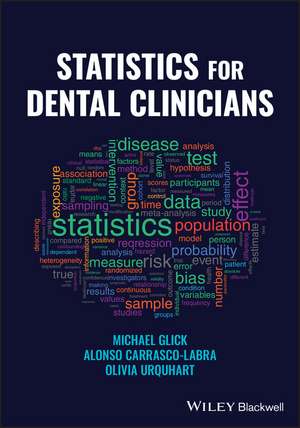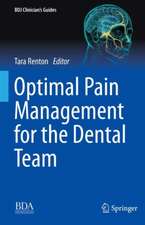Statistics for Dental Clinicians
Autor M Glicken Limba Engleză Paperback – 27 aug 2023
Preț: 518.89 lei
Preț vechi: 546.20 lei
-5% Nou
Puncte Express: 778
Preț estimativ în valută:
99.30€ • 107.83$ • 83.41£
99.30€ • 107.83$ • 83.41£
Carte disponibilă
Livrare economică 01-15 aprilie
Livrare express 15-21 martie pentru 36.52 lei
Preluare comenzi: 021 569.72.76
Specificații
ISBN-13: 9781119810162
ISBN-10: 1119810167
Pagini: 240
Dimensiuni: 179 x 255 x 32 mm
Greutate: 0.52 kg
Editura: Wiley
Locul publicării:Hoboken, United States
ISBN-10: 1119810167
Pagini: 240
Dimensiuni: 179 x 255 x 32 mm
Greutate: 0.52 kg
Editura: Wiley
Locul publicării:Hoboken, United States
Notă biografică
Cuprins
Preamble xi
1 What is statistics and why do we need it? 1
Selected readings 7
2 Understanding and interpreting measures of association 8
Effect and effect size 8
Dichotomous outcome variables 9
Data presentation and interpretation 9
Absolute risk 9
Absolute risk difference 10
Relative risk or risk ratio 10
Odds ratio 11
Mean difference 11
A few additional notes 12
Selected readings 16
3 Understanding and interpreting a standard deviation and normal distribution 17
A few additional notes 22
Selected readings 23
4 Understanding and interpreting standard error 24
Interpretation of the standard error of the mean 25
Implication of the standard error of the mean 26
A few additional notes 26
Selected readings 29
5 Understanding and interpreting hypothesis testing and p-values 30
Descriptive and inferential statistics 30
Sampling error 31
Hypothesis testing or null hypothesis significance testing 31
Null and alternative hypotheses 32
Significance 33
P-value 34
A few additional notes 36
Selected readings 37
6 Understanding and interpreting a confidence interval 38
Understanding the confidence interval 39
How to interpret a confidence interval 39
A few additional notes 41
Selected readings 44
7 Understanding and interpreting power analysis and sample size 45
Sample size: Why is it important? 45
Components of a sample size calculation 46
Size of the effect 46
Significance level and type I error 47
Power and type II error 49
A few additional notes 50
Selected readings 53
8 Understanding and interpreting a survival analysis 54
Kaplan-Meier or survival curve 55
Comparing two Kaplan-Meier (survival) curves 57
Cox proportional hazard model 58
A few additional notes 59
Selected readings 60
9 Understanding and interpreting a probabilistic-based diagnosis 61
Sensitivity 61
Specificity 63
Positive predictive value 63
Negative predictive value 63
Likelihood ratios 65
Selective readings 68
10 Understanding and interpreting a correlation 69
Pearson product-moment correlation 69
Interpretation of Pearson correlation coefficients and coefficient of determination 71
Misinterpretation of correlations 73
A few additional notes 74
Selected readings 74
11 Understanding and interpreting a regression analysis 76
Estimation 76
Prediction 77
Linear regression 77
Multiple (or multivariable) linear (MLR) regression 79
Logistic regression 79
Predicting risk and odds 80
A hypothetical example: predicting risk and odds of an outcome 80
Estimating odds ratios 81
A hypothetical example--estimating an odds ratio 81
Nonindependence of observations 82
Building a regression model 82
A few additional notes 82
Selected readings 85
12 Understanding and interpreting confounding and effect modification 86
Counterfactual framework and causal reasoning 86
Causal inference and confounding bias 87
Strategies to deal with confounding in the study design phase 89
1. Randomization 90
2. Specification 90
3. Matching 90
Strategies to deal with confounding in the analysis phase 92
1. Stratification 92
2. Propensity score 92
3. Traditional regression modeling 93
Effect modification 94
A few additional notes 95
Selected readings 97
13 Understanding and interpreting bias 98
Random error versus systematic error (bias) 98
What does it really mean? 99
Distinguishing risk of bias, methodological quality, and reporting quality 100
Assessing risk of bias in primary studies 101
A few additional notes 104
Selected readings 105
14 Understanding and interpreting patient-reported outcomes 106
Identifying optimal patient-reported outcome measures 108
Validity 108
Reliability 109
A hypothetical scenario--Cohen's kappa (k) 109
Responsiveness 110
A few additional notes 111
Selected readings 112
15 Understanding and interpreting a cross-sectional study 113
Bias in cross-sectional studies 113
Response rate and avoiding nonresponse 114
Analysis of cross-sectional studies 115
Advantages and limitations of a cross-sectional study 116
A few additional notes 116
Selected readings 119
16 Understanding and interpreting a case-control study 120
Selection of the study population 120
Identifying cases 120
Identifying controls 122
Retrospective assessment of the exposure 122
Strengths and limitations 124
Selected readings 125
17 Understanding and interpreting a cohort study 126
Types of cohort study designs 126
Selection of the study population 127
Measuring exposures 128
Measuring outcome frequency 129
Measures of association 129
Bias in cohort studies 130
Selection bias 130
Nonparticipation and nonresponse 130
Loss to follow-up or attrition bias 130
Information bias: Dissimilar information between exposed and unexposed participants 130
Confounding 131
Strengths and limitations 131
Suggested readings 132
18 Understanding and interpreting a randomized controlled trial 133
Study arms 135
Type of outcomes 135
Methodological strategies in randomized controlled trials 137
Nonadherence to study protocol 137
Missing data 139
Subgroup analysis or effect modification 140
A few additional notes 142
Selected readings 144
19 Understanding and interpreting meta-analyses 145
The value of meta-analysis 145
Pairwise meta-analysis 146
Fixed effect meta-analysis 146
Random effects meta-analysis 147
Weight of each study in a meta-analysis 147
Forest plots 147
Heterogeneity 149
Network meta-analysis 151
Sensitivity analysis 152
Certainty of the evidence 152
A few additional notes 153
Selected readings 154
20 Understanding and interpreting statistical and clinical significance 155
A few additional notes 158
Selected readings 158
Appendix 1 Formulas and equations 160
Appendix 2 Z-table 183
Appendix 3 T-table 185
Glossary 189
Index 210











